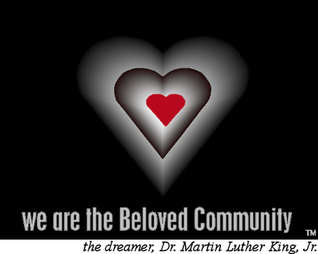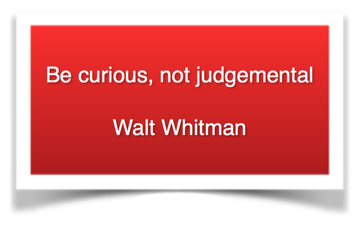|
“Fellowship of the Saints” is a common bond most Christians long for. Unfortunately, congregations and Christians that strive to look and act “saintly” undermine the fellowship they desire. The deep bond of fellowship in Jesus does not come through boasting in our righteousness but confessing our sin and sharing our brokenness with one another. When Jesus walked the earth he created a culture where sinners were welcome and the self–righteous were made to feel uncomfortable and threatened. When the pious fellowship questioned Jesus about eating and drinking with tax collectors and sinners he said, “It is not the healthy who need a doctor but the sick. But go and learn what this means: I desire mercy, not sacrifice. For I have not come to call the righteous, but sinners.” Jesus included within his circle of friendship those who were beat down by the weight of systemic and personal sin. He offered them a protected space where they could be real. They shared meals together, laughed and cried together, they watched as Jesus healed their friends and listened as he spoke words of forgiveness over them. This fellowship of the undevout was based in Jesus, not in their own righteousness. Their deep and infectious fellowship remained long after Jesus returned to heaven because of the solution Jesus brought to their spiritual malady. I think the typical Christian congregation could learn much from the recovery community. The fellowship people in recovery share is best described in the second chapter of the Big Book of Alcoholics Anonymous: We are people who normally would not mix. But there exists among us a fellowship, a friendliness, and an understanding, which is indescribably wonderful . . . The feeling of having shared in a common peril is one element in the powerful cement, which binds us; but that in itself would never have held us together as we are now joined. The tremendous fact for every one of us is that we have discovered a common solution.
If we want to create a Fellowship of Saints in our faith communities, maybe a good first step would be greeting one another to our meetings with words similar to those you hear in an A.A. meeting:
Hello, my name is Larry, a recovering sinner.
0 Comments
I set a goal at the beginning of the year to reflect weekly on the red letters in my Bible and write about my experience throughout the year. This week I’ve been reminded, once again, that it’s not enough to simply reflect on the cool things Jesus said; I must allow his Word to change me and mold my behavior. The Red Letters of Jesus are a holy mix of invitation and challenge. In his Book, Building a Discipleship Culture, Mike Breen says, “Jesus created a highly inviting but highly challenging culture for his disciples to function and grow within.” He goes on to say, “Invitation is about being invited into a relationship where you have access to a person’s life and all the vibrancy, safety, love and encouragement that reside there . . . but by accepting the invitation, you also accept the challenge that comes with it: the challenge to live into your identity as a son or daughter of the King.” INVITATIONSome of the things Jesus said make me feel safe and secure—welcomed and loved by God. They invite me into a covenantal relationship with Jesus. Come to me all who labor and are heavy laden and I will give you rest. I stand at the door and knock. If anyone hears my voice and opens the door, I will come in and eat with that person, and they with me. Do not be afraid, little flock, for your Father has been pleased to give you the kingdom. CHALLENGEOther things Jesus said are rather challenging, hard to hear and difficult to put into practice. Anyone who has two shirts should share with the one who has none, and anyone who has food should do the same. If someone slaps you on one cheek, turn to them the other also. If someone takes your coat, do not withhold your shirt from them. I tell you, love your enemies and pray for those who persecute you. The truly wise person will take Jesus up on his invitation. They will take time to sit at his feet and listen intently to the words he speaks. After spending time hearing and reflecting on God’s word, soaking in the Spirit and adoring the wonder of God’s presence, they will put into practice what they receive. In contrast the foolish person will spend all of their time consuming, never sharing what they receive or putting into practice what they hear. Jesus breaks it down by saying, the one who hears his word and puts it into practice, is like a wise person who builds their house on a rock-solid foundation. The storms of life will not shake their house. On the other hand, the one who hears the word and changes nothing in their behavior, is like a foolish man who builds his house on the sand. When the storms of life come their house will crumble.
Some people are way too judgmental . . . I can tell just by looking at them! Do you find yourself pre-judging others before you get to know them? If you don’t, I admire your character. If you do, welcome to the human condition! It seems we’re all prone to judge others before we get to know them; especially if they look different, act different or dress different than “we” do. I’ve been thinking this week about our tendency to pre-judge others and grieving the way it impedes our ability to build beloved communities—communities where everyone is welcome and honored. A beloved community is what Jesus had in mind when he invited his first disciples to follow him and what Dr. Martin Luther King Jr. dreamed about. Can you imagine a community based on justice, equal opportunity, and love—a place where all people share in the wealth of the earth? Can you imagine a world where racism and all forms of discrimination, bigotry and prejudice are replaced by an all–inclusive spirit of sisterhood and brotherhood? This is the way the King Center defines Martin’s vision of a beloved community. If those of us, who follow the way of Jesus, have any hope of living in a beloved community we must “think red together.” We must stop judging and start loving! Jesus tells us straight up: Do not judge, or you too will be judged. For in the same way you judge others, you will be judged, and with the measure you use, it will be measured to you. Here are four ways we can help cultivate a non-judgmental, beloved community: Keep your side of the street clean: or, as they say in the recovery community, “do your own inventory, not your neighbors.” Jesus said it this way, “Why do you look at the speck of sawdust in your brother’s eye? . . . First take the log out or your own eye, and then you will see clearly to remove the speck from your brother’s eye.” When you find yourself judging others take the time to reflect on your motives, discern what is underneath your judgmental spirit. Quit thinking “tolerance” is the answer: Jesus didn’t commandment us to tolerate one another; he said we are to love one another in the same way he loved us. You will never feel like you truly belong if you know your presence in the community is “being tolerated.” Beloved communities don’t tolerate diversity they thrive in it. Taste the flavor of other cultures: There are secret treasures in the kingdom of Heaven that will remain hidden from us as long as we stand in judgment of people from other cultures. A fun and rewarding way to taste the deep and joyful flavor of God’s kingdom is to seek God in cultures different from yours. Enjoy the art, read the literature, learn the history, taste the food of other cultures and make friends with people who see the world different than you. Dream Together: Instead of judging others dream together about a community where everyone is loved, welcome and treated with equity.
I have a friend who says it helps to worry about things. Her proof is based on simple logic; she says, “The things I worry about never happen!” So go ahead and worry about tomorrow! Whatever you’re worried about probably won’t come to pass. However, there is a down side to this approach—worrying about tomorrow will rob you of joy today. Jesus identified generalized anxiety as a spiritual issue that diminishes life. In Matthew chapter six, Jesus offers a pathway to help us overcome the crippling effects of anxiety. He doesn’t suggest deep breathing exercises, aroma–therapy, cold showers, or yoga; although I believe all of these disciplines have great value and will increase endorphins. Jesus simply tells us to shift our focus. Rather than focus on the things we’re worried about, Jesus tells us to shift our focus in three ways:
LOOK WITHIN: Jesus knows that anxiety and stress are part of the human experience. He’s aware of our need to feel in control. He knows we’re prone to dwell on the troubles of tomorrow. He also knows, “each day has enough trouble of its own.” That’s why Jesus tells us to look within and “seek first the kingdom of God and God’s righteousness.” God knows what we need before we ask. When the troubles of tomorrow overshadow the challenges of today it will drain our strength, weaken our faith and rob our joy. God’s kingdom dwells within us. When we seek God’s kingdom, God will provide what we need to meet the challenges of the day. What are you stressing about today? Maybe it’s time to shift your focus. Before you get all worked up, look up! Before you get stressed out, look out! Before you do anything, look within and seek God’s kingdom! |
AuthorLarry Stoess is an author, public speaker, and urban church planter. He loves telling stories about how dreaming with God will empower people to make old and broken things new again. Larry and a band of friends founded the Church of the Promise in Louisville's Portland neighborhood; The Table, a pay-what-you-can community café; and Promise Housing Plus, a non-profit construction company. He has written about their experience of dreaming with God in his new book: Think Red. Archives
August 2023
Categories |
|
Contact Us |














 RSS Feed
RSS Feed